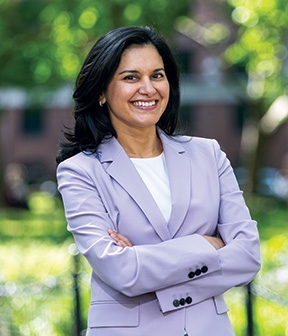Legal Mind: Avani Mehta Sood uses psychology to illuminate the processes of legal decision-making
Professor of Law Avani Mehta Sood, a social psychologist and legal scholar who joined the NYU Law faculty in July, once thought she would become a journalist. But when Sood leafed through a law school course catalog during her senior year at Princeton University, where she was majoring in psychology, everything changed. She was so intrigued by the course offerings in law that she spent the year after graduation as a paralegal in the Manhattan District Attorney’s Office and then went on to attend Yale Law School.
Following law school, Sood clerked for Judge Kimba Wood of the US District Court for the Southern District of New York. Wood describes Sood as someone with “a passion for using law to effectuate justice,” adding, “[S]he’s tireless. You can begin a discussion with her in the morning and not end it until the evening, and she still has thoughts left over for the next day.... She’s just very interested in whatever is raised with her.”
Sood also worked as a litigation associate at Debevoise & Plimpton in New York and as a legal fellow in the Center for Reproductive Rights’ International Legal Program, doing field research and trainings in India and Kenya on large-scale women’s rights violations and legal mechanisms for redressing them.
“In all these different domains of law, I noticed gaps between expectations of the legal system and the psychological realities of legal decision makers,” she says. “I wanted to use tools of empirical psychology to identify and address these disconnects.” Sood therefore pursued a PhD in psychology at Princeton before launching her law teaching and research career. “What drew me to academia was that it enabled me to dig into legal questions from all sides and through an interdisciplinary lens, to apply psychology toward advancing justice in the legal system.”
In her scholarship, Sood uses original psychological research to challenge unexamined assumptions and biases in legal decision-making. Her PhD dissertation investigated how and when legal judgments are inadvertently driven by decision makers’ preferred outcomes, a phenomenon known as motivated cognition. Her most recent work empirically tests the conventional legal wisdom that a general verdict (in which a jury expresses only a conclusion of “guilty” or “not guilty”) entails a more favorable process for criminal defendants than a special verdict (in which a jury indicates whether each element of a crime has been proven beyond a reasonable doubt). Sood’s findings suggest that the special verdict process of responding to interrogatory questions before reaching a conclusion might help enforce constitutional protections and curtail jury biases. She is also currently writing a book on the psychology of criminal law.
Sood comes to NYU Law from the University of California, Berkeley, School of Law, where she taught Criminal Law, Evidence, and the Colloquium on Law and Psychology since 2013. At NYU, Sood will teach Criminal Law, her colloquium, and a seminar on psychological dimensions of criminal law. In addition, she has plans to develop other law and psychology, empirical methodology, and advanced criminal law seminars.
Having attended high school in New York, Sood relishes returning to the city with her husband, Michael Mehta Webster—who is joining NYU’s Department of Environmental Studies as a professor of practice specializing in marine biology—and their two younger children (the oldest is in college). She looks forward to enjoying the walkability, small-town feel, and culinary scene of Greenwich Village. But she expresses even more excitement about being part of NYU’s criminal law faculty, whose scholarship she has long admired, and being an affiliate of NYU’s Department of Psychology. Sood is also setting up a psychology lab at the Law School, opening up further interdisciplinary possibilities.
“She’s this great combination of a superb lawyer and a social psychologist,” says Vice Dean Rachel Barkow, Charles Seligson Professor of Law. “She’s going to be just terrific, both as a colleague for fellow faculty members [and] for the students. She’s been legendary around Berkeley in terms of mentoring…. I think she’s going to be an institutional all-star.”
Posted September 8, 2022


